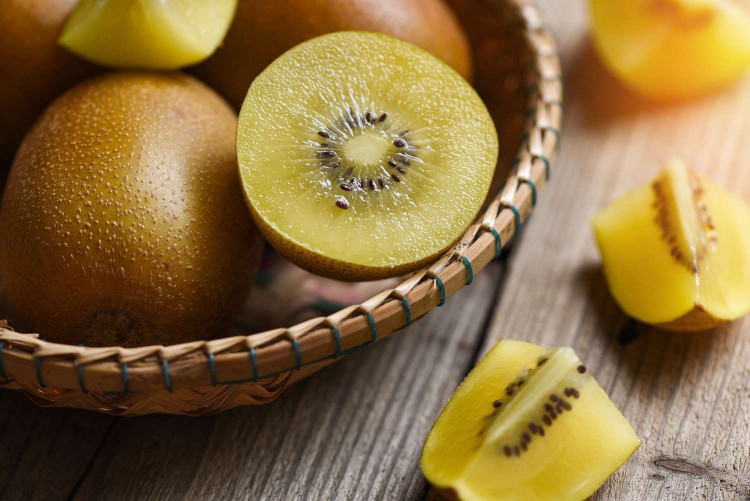Increasing kiwi consumption could help you eliminate the need for vitamin C supplementation, a new study finds.
New research, published last month in Foods, found that consuming two SunGold kiwifruit daily for six weeks increased ascorbic acid (or vitamin C) intake by 150 mg per day.
Researchers noted that consuming this level of vitamin C daily eliminates the need for supplementation and comes with various health benefits.
“Kiwifruit is known to boost your immune system,” Laura Purdy, MD, MBA, a board-certified family medicine physician, told Health. “Having a strong immune system is key during cold and flu season to help protect yourself from getting the virus.”
Unlike green kiwis which have fuzzy brown skin, an oval shape, and green fruit, gold kiwifruits have smooth, hairless skin and yellow fruit. Gold kiwis also contain more than 290% of the vitamin C you need daily.
While this study on the effects of eating kiwifruit daily was small in size—consisting of only 24 healthy males between the ages of 25 and 60 without a history of type 1 or 2 diabetes or glucose intolerance—the results were promising.
Not only did the participants increase their vitamin C levels, but their fiber intake also increased, and their inflammatory and metabolic biomarkers were not negatively impacted.
This means it is safe to consume kiwifruit daily without any adverse reactions to your metabolism—unless you’re allergic to it. Purdy explained that, interestingly, it is not uncommon to be allergic to kiwifruit.
Here’s how daily kiwi consumption can boost vitamin C levels and make a positive impact on overall well-being.

Getty Images / Wirestock
Kiwis are powerhouses when it comes to vitamin C.
When most people think about boosting vitamin C, they may consider eating more oranges or adding a supplement to their diet.
“By adding one or two kiwi per day, you can be sure that you are getting the recommended amount of vitamin C,” Wyman said.
She explained that, in addition to this high vitamin C percentage, snacking on kiwis may replace a less nutrient-dense snack, which can improve overall nutrition and well-being.
According to Wyman, a SunGold kiwi contains 130 mg of vitamin C for an 80 g piece of fruit. The green variety contains 70 mg of vitamin C and is slightly smaller in size.
“If you enjoy kiwifruit, they are a great source for meeting your daily requirement of vitamin C,” she said.
There is limited research on whether or not kiwifruit will prevent you from getting a cold or flu—even with its large quantities of vitamin C.
The idea of taking large doses of vitamin C to prevent the common cold originated in the 1970s when scientist and researcher Linus Pauling speculated that a daily vitamin C intake of 1,000 mg could reduce the incidence of colds by about 45%.
However, other clinical studies since then have failed to demonstrate its efficacy.
That said, researchers in a 2012 study did find that eating kiwifruit could potentially shorten the duration of a cold.
Scientists found that people who ate four gold kiwis a day reported less severe congestion and sore throat pain than the control group. The participants who ate kiwis each day also noted that their cold symptoms resolved faster than those in the control group.
There also are other benefits to eating kiwifruit.
Research has found that regularly eating kiwis can increase HDL cholesterol (“good” cholesterol), reduce triglycerides, and lower blood pressure. And, gold kiwis, in particular, may help people with anemia boost their iron levels when eaten alongside iron-rich meals.
“Incorporating kiwi into your daily routine this winter is a practical way of taking in vitamin C because smaller doses are more readily absorbed than one large dose, such as a supplement,” says Wyman.
She recommends that people plan to have a kiwi as part of a midday snack or dessert, along with other fruits and vegetables that contain higher levels of vitamin C.
According to Wyman, obtaining vitamin C from a variety of fruits and vegetables is preferred to supplements because they offer many other benefits as opposed to one single vitamin.
“It is interesting to note that in studies of vitamin C and prevention or treatment of disease, [researchers] state that it is difficult to separate the benefits of vitamin C with the synergistic effect of all the components in fruit and vegetables, for example, fiber, folate, magnesium, and potassium,” she said.
If you are looking to boost your vitamin C but do not like kiwi or are allergic to it, you can find vitamin C in several other foods, too.
Aside from oranges, bell peppers in all colors have generous amounts of vitamin C, with orange bell peppers having the most, explained Wyman.
“You can also get a comparable amount of vitamin C in kale, broccoli, Brussels sprouts, cabbage, strawberries, and pineapple,” she said.